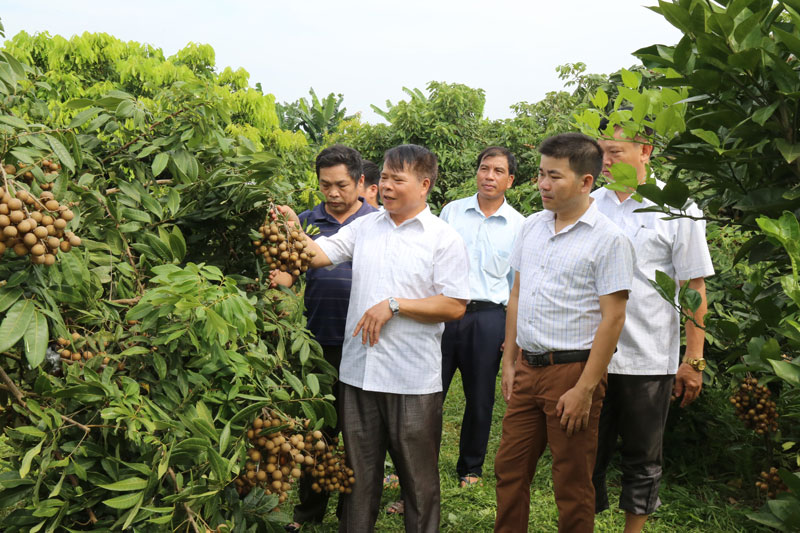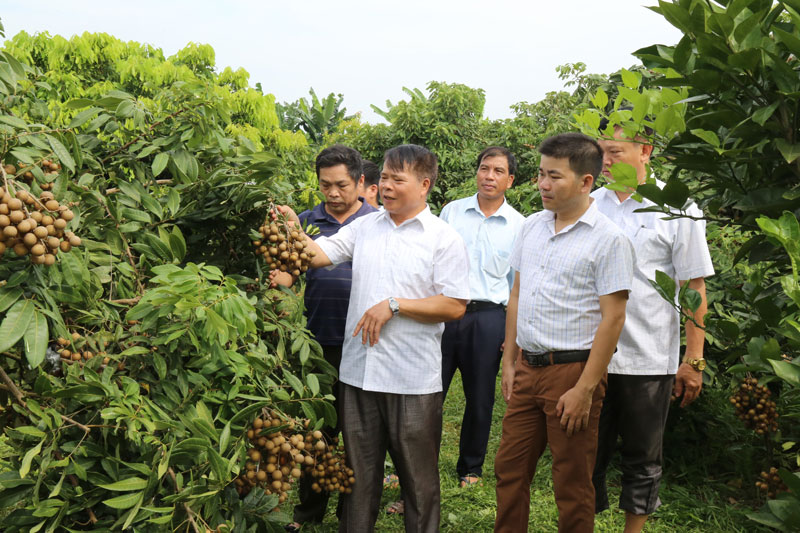
HBO – From an agriculture-based commune with a lot of economic difficulties, Dong Bac commune in Kim Boi district has emerged as one of the communes achieving comprehensive development.

Officials, party members of Dong Bac
commune, Kim Boi district, visit a longan growing model of party member Bui Van
Thuan in Ve hamlet.
Bui Van
Thuan, deputy head of the Dong Bac commune Party Committee’s Inspection
Commission and a Party member in Ve hamlet, has seen the busiest these days.
The reason is that more than 300 longan trees of his family are in harvest
season. This year, the total longan output is expected to exceed seven tonnes.
His longan fruits, produced in line with the VietGap standards, are favourite
in the market.
His
longan growing model was built in 2012, Thuan said, adding that his family took
all the area of the commune’s deserted swamp and improved it for growing longan
trees as part of efforts to restructure crops.
As a
member of the Fruit Growing Cooperative of Son Thuy commune, he learns longan planting
technique and commits to produce longan fruits in line with the VietGap
standards. As a result, his longan garden generates hundreds of millions dongs
per year.
Thuan’s
longan garden is among the outstanding economic models run by Party members.
Bui Duc Binh, Secretary of the Dong Bac commune Party Committee, highlighted
the commune’s favourable conditions for economic development, saying that it
locates on
National Road12B and near the district downtown. However, the commune had witnessed no
breakthrough development, because most of local farmers grew rice on small-sized
fields and in a traditional way, which hampered technological application.
Being
aware of the reality, the commune’s Party Committee developed and issued a
resolution on improving mixed gardens, restructuring crops and developing
high-valued fields. In order to implementing the resolution, the leadership
role of communal party organisations and members has been identified as the key
factor and they have to set examples for all people. Therefore, the commune has
joined hands with Kim Boi district’s sectors to send its cadres and party
members to learn effective economic models to apply in the locality.
Promoting
the role of local officials and party members in economic development has given
a boost to production in the commune. The commune’s party organisation
instructed the administration and social organisations to play their leadership
and pioneering role in economic restructuring.
Currently, a large number of
party members have fully taken use of land to restructure their crops by
growing high-value trees, such as sugarcane, red-pulp dragon fruits, citruses,
and longan trees.
Local farmers are encouraged to
cultivate in line with the VietGap standards to enhance their agricultural
products’ value. Over 40 hectares of high-yield fruit trees have been grown
across the commune.
According to data from the Hoa Binh Provincial Party Committee, the industrial production index for the first six months of 2025 is estimated to have increased by 20% compared to the same period last year. This marks the highest year-on-year growth rate for this period since 2020.
In the first six months of 2025, Hoa Binh province’s export turnover was estimated at 1.145 billion USD, marking an 18.11% increase compared to the same period in 2024. Import turnover was estimated at $ 804 million, a 17.15% increase, which helped the province maintain a positive trade balance.
The lives of the ethnic minority farmers in Tan Lac district have gradually improved thanks to the new directions in agricultural production. This is a testament to the collective strength fostered through the professional associations and groups implemented by various levels of the district’s Farmers’ Union.
With the motto the "product quality comes first,” after nearly one year of establishment and operation, Muong village’s Clean Food Agricultural and Commercial Cooperative, located in Cau Hamlet, Hung Son Commune (Kim Boi district), has launched reputable, high-quality agricultural products to the market that are well-received by consumers. The products such as Muong village’s pork sausage, salt-cured chicken, and salt-cured pork hocks have gradually carved out a place in the market and they are on the path to obtaining the OCOP certification.
In the past, the phrase "bumper harvest, rock-bottom prices" was a familiar refrain for Vietnamese farmers engaged in fragmented, small-scale agriculture. But today, a new spirit is emerging across rural areas of Hoa Binh province - one of collaboration, organisation, and collective economic models that provide a stable foundation for production.
Maintaining growing area codes and packing facility codes in accordance with regulations is a mandatory requirement for agricultural products to be eligible for export. Recently, the Department of Agriculture and Environment of Hoa Binh province has intensified technical supervision of designated farming areas and packing facilities to safeguard the "green passport" that enables its products to access international markets.



